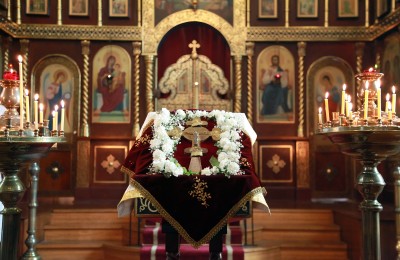IX. 1. Christians are called to be law-abiding citizens of their homeland on earth, accepting that every soul should be «subject unto the higher powers» (Rom. 13:1) and at the same time remembering the commandment of Christ to render «unto Caesar the things which be Caesar’s, and unto God the things which be God’s» (Lk. 20:25). The human sinfulness, however, generates crime, which is violation of the limits established by law. At the same time, the conception of sin established by the Orthodox moral norms is broader than the idea of crime expressed in the secular law.
The primary cause of crime is the darkened state of the human heart: «for out of the heart proceed evil thoughts, murders, adulteries, fornications, thefts, false witness, blasphemies» (Mt. 15:19). It should be also admitted that sometimes crime is provoked by economic and social conditions, as well as the weak government and the absence of lawful order. Criminal communities may penetrate public institutions and use them for their own purposes. Finally, the authority itself may become a criminal by committing illegal actions. Especially dangerous is crime disguised under political and pseudo-religious motives, such as terrorism and the like.
To keep crime in check, the state establishes law-enforcement bodies. Their aim is to prevent and investigate crimes and to punish and reform criminals. However, the task of eradicating crime and reforming those who took a false step should be undertaken not only by the state, but all the people, and it means by the Church, too.
IX. 2. The prevention of crime is possible first of all through education and enlightenment aimed to assert in society the authentic spiritual and moral values. In this task the Orthodox Church is called to intensive co-operation with school, mass media and law-enforcement bodies. If the people lack a positive moral ideal, no measures of coercion, deterrence or punishment will be able to stop the evil will. That is why the best form of preventing crime is the preaching of the honest and proper way of life, especially among children and youth. In this effort,close attention should be given to the so-called risk-groups or those who have already committed first offences. These people need a special pastoral and educational care. The Orthodox clergy and laity are called to take part in the efforts to overcome the social causes of crime, showing concern for the just order in society and economy and for the self-fulfilment of every member of society in his profession and life.
At the same time, the Church insists on the need of humane attitude towards suspects, persons under investigation and those caught in criminal intent. The crude and improper treatment of these people can either fortify them on the wrong track or push them on it. For this reason, those awaiting a verdict should not be disfranchised even in custody. They should be guaranteed advocacy and impartial justice. The Church condemns torture and indignities towards persons under investigation. The priest, even with a view to assist law-enforcement, cannot violate the secrecy of confession and other secrecy safeguarded by law (for instance, the secrecy of adoption). In their care of those who went astray and were convicted, pastors, on learning anything that was concealed from investigation and justice, shall be guided by the secrecy of confession.
The norm providing for the secrecy of confession is included in the legislation of many states today, including the Constitution of the Russian Federation and Russia’s Law on the Freedom of Conscience and on Religious Associations.
The priest is called to show special pastoral sensitivity in case of a confession revealing a criminal intent. While keeping sacred the secrecy of confession without any exceptions and in any circumstances, the pastor is obliged to make all possible efforts to prevent a criminal intent from being realised. First of all it concerns threats of homicide, especially the massacre possible in the acts of terrorism or execution of a criminal order during war. Remembering that the souls of a potential criminal and his intended victim have equal value, the priest should call the penitent to make authentic repentance, that is, to abandon his evil intent. If this call is not effective, the pastor, keeping secret the penitent’s name and other circumstances which can help identify him, may give a warning to those whose life is threatened. In difficult cases, the priest should apply to the diocesan bishop.
IX. 3. Any crime committed and condemned by law presupposes a fair punishment. Its meaning is to reform an infringer, to protect society from a criminal and to stop his illegal activity. The Church, without taking upon herself to judge an infringer, is called to take care of his soul. That is why she understands punishment not as revenge, but a means of the inner purification of a sinner.
Establishing punishment for culprits, the Creator says to Israel: «Thou shalt put evil away from among you» (Deut. 21:21). Punishment for crime serves to teach people. Thus, establishing punishment for false prophesy, God says to Moses: «All Israel shall hear, and fear, and shall do no more any such wickedness as this is among you» (Deut. 13:11). We read in the Proverbs of Solomon: «Smite a scorner, and the simple will beware: and reprove one that hath understanding, and he will understand knowledge» (Prov. 19:25). The Old Testament tradition knows of several forms of punishment including the death penalty, banishment, restriction of freedom, corporal punishment and fine or order to make a donation for religious purposes.
Confinement, banishment (exile), reformatory labour and fines continue as punishments in the contemporary world. All these penalties are relevant not only in protecting society from the evil will of a criminal, but are also called to help in reforming him. Thus, confinement or restriction of freedom gives a person who outlawed himself an opportunity to reflect on his life in order to come back to liberty internally purified. Labour helps educate a person for creativity and helps him to acquire useful skills. In the process of reformatory labour, the sinful element deep in the soul should give place to creative endeavour, order and spiritual peace. It is important at the same time to ensure that inmates are not subjected to inhumane treatment, that the conditions of confinement do not threaten their life and health and that their moral condition is not influenced by the pernicious example of other inmates. To this end the state is called to take care of convicts, while society and the Church to help them in it.
In Christianity, kindness towards prisoners for the sake of their reformation has deep roots. The Lord Jesus compares charity towards prisoners to the service of Himself: «I was in prison, and ye came unto me» (Mt. 25:36). History remembers many men of God who helped those in prisons. The Russian Orthodox tradition has implied charity toward those fallen from old times. St. Innocent, Archbishop of Kherson, addressed these words to inmates in a prison church in Vologda: «We have come here not to condemn you, but to give you consolation and edification. You can see for yourselves how the Holy Church has come to you with all her Sacraments. So you, too, move not away from her, but approach her with faith, repentance and your ways reformed… The Saviour is even now holding out his hands from the cross to all the repentant; so you, too, repent and you will come from death to life!»
In her ministry in penitentiaries, the Church should arrange churches and prayer rooms in them, administer Sacraments and celebrate, hold pastoral talks with inmates and distribute religious literature. Especially important is the personal contact with inmates including visiting them in cells. Every encouragement should be given to correspondence with convicts and collection and distribution of clothes, medicines and other necessities. These efforts should be aimed not only to relieve the heavy lot of prisoners, but also to help in the moral healing of their crippled souls. Their pain is the pain of the whole Mother Church who rejoices with heavenly joy when even «one sinner repentieth» (Lk. 15:10). The revival of the care for prisoners has become an important field of pastoral and missionary work, which needs to be supported and developed.
The death penalty as a special punishment was recognised in the Old Testament. There are no indications to the need to abolish it in the New Testament or in the Tradition or in the historical legacy of the Orthodox Church either. At the same time, the Church has often assumed the duty of interceding before the secular authority for those condemned to death, asking it show mercy for them and commute their punishment. Moreover, under Christian moral influence, the negative attitude to the death penalty has been cultivated in people’s consciousness. Thus, in the period from the mid-18th century to the 1905 Revolution in Russia, it was applied on very rare occasions. For the Orthodox church consciousness, the life of a person does not end with his bodily death, therefore the Church continues her care for those condemned to capital punishment.
The abolition of death penalty would give more opportunities for pastoral work with those who have stumbled and for the latter to repent. It is also evident that punishment by death cannot be reformatory; it also makes misjudgement irreparable and provokes ambiguous feelings among people. Today many states have either abolished the death penalty by law or stopped practicing it. Keeping in mind that mercy toward a fallen man is always more preferable than revenge, the Church welcomes these steps by state authorities. At the same time, she believes that the decision to abolish or not to apply death penalty should be made by society freely, considering the rate of crime and the state of law-enforcement and judiciary, and even more so, the need to protect the life of its well-intentioned members.
IX. 4. Seeking to help overcome crime, the Church enters into co-operation with law-enforcement agencies. Respecting the efforts of their workers, aimed to protect the citizens and the country from criminal designs and to reform those who have stumbled, the Church lends them a helping hand. This assistance may be realised in various joint educational efforts for preventing offences, in scientific and cultural work and in the pastoral care of the law-enforcers themselves. Co-operation between the Church and the law-enforcement is based on the church statutes and special agreements concluded with the leadership of law-enforcement departments.
However, it is the pastoral care of the Church, given especially in the Sacrament of Repentance, that is called to be the most effective means in overcoming crime. To any repentant of an offence the priest should resolutely offer to abandon in the Face of God any attempt to continue his criminal activity as an indispensable condition for the absolution from his sin. Only in this way a person will be compelled to abandon the way of lawlessness and to return to the life of virtue.



 Russian
Russian
